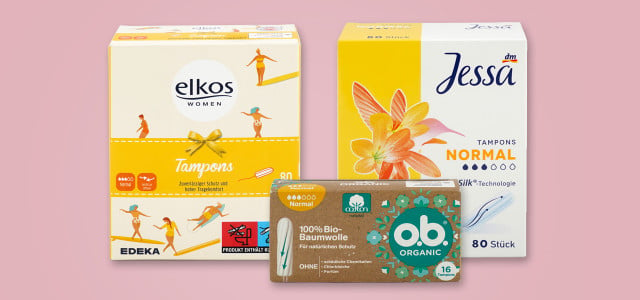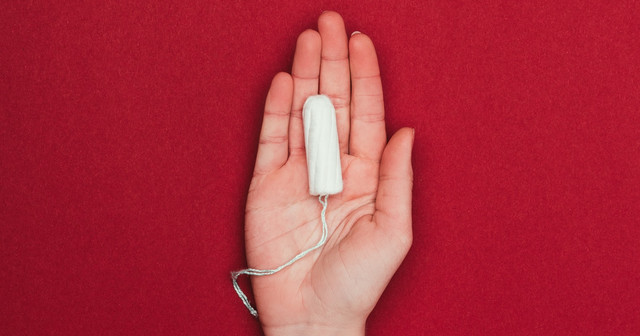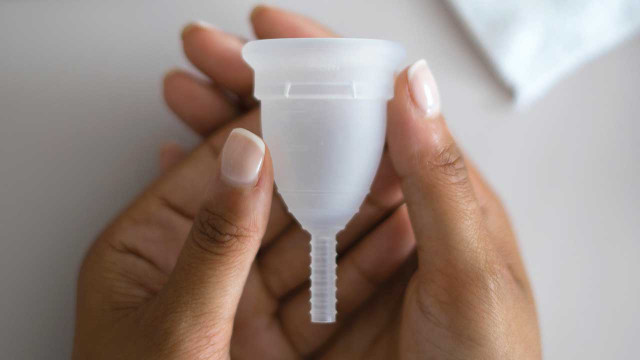
A menstruating person bleeds for almost seven years in their life. Many of them resort to tampons when they have their period. Öko-Test has tested well-known tampon brands several times – with mostly positive results.
Tampons are the first choice for many menstruating women during their period, although there is now a lot of competition from other products such as menstrual cups. The small white helpers made of cotton wool are handy and reliable.
Test 2024: Lead and arsenic in tampons?
Öko-Test has had tampons tested several times – most recently in August 2024. Here, the consumer advocates examined 23 products in various sizes, including “ob Organic Tampons, normal” from Johnson & Johnson (0.14 euros per tampon) and “Jessa Tampons 80 pieces, normal” from dm (0.03 euros each). The commissioned laboratory tested exclusively for heavy metals such as lead, arsenic and mercury and the toxic trace element antimony. The investigation focused on the substances because a US study had previously identified heavy metals in various tampon samples – albeit in tiny amounts. Products from Europe were also affected.
Öko-Test can give the all-clear: All products received the rating “very good”. With the exception of mercury and selenium, the laboratory found all of the pollutants that the US study had identified – but the contamination was even lower than in the US study. None of the products exceeded pollutant limits – Öko-Test based its assessment on the strict guidelines of the Blue Angel environmental seal for absorbent hygiene products.
Only in the case of the product “Satessa Tampons normal” from Aldi (0.03 euros per tampon) did the antimony content in the product exceed the limit. But according to the testers’ calculations, it is virtually impossible to absorb too much antimony through the tampons. Even if the pollutant were to dissolve completely from the product – which it did not in laboratory tests – women weighing 60 kilos would have to use over 180 tampons a day during their menstruation, according to the testers.
Tampons: Read the 2024 test as ePaper
2022: Öko-Test tests tampons from ob, dm and Co.
Öko-Test took a closer look at 19 different tampons in 2022. The test products included branded products, own-brand tampons from drugstores and tampons from discounters. All had a strength of “three drops”, which corresponds to an absorbency for use with normal bleeding. Only three “super” products were tested – these brands come from Italy, Great Britain or Sweden. Six of the tampons tested are made of organic cotton.
In the test, the tampons were examined for harmful substances (both on the outside and in the core) and tested in the laboratory for unnecessary optical brighteners, for skin-irritating formaldehyde from fiber-stabilizing additives, and for controversial halogenated organic compounds that can come from bleaching the material. The products were also tested for traces of nonylphenol ethoxylates, which the textile industry uses as surfactants for washing processes. The tampons and packaging were also tested for environmentally harmful compounds such as PVC. Last but not least, the testers also subjected the tampons to an extensive practical test and checked whether the removal thread breaks, whether the absorbency is appropriate and whether handling is comfortable and easy.
Öko-Test Tampons: Generally “very good”
The good news: All tampons achieved positive results in 2022. 17 out of 19 products received the top rating, while the remaining tampons at least achieved a “good” overall rating. Points were deducted from the two products because the removal thread was only moderately tear-resistant.
The test winners for conventional tampons included:
-
Elkos Women Tampons, normal (from Edeka)
-
Jessa tampons, normal (from dm)
-
whether Extra Protect Tampons Normal, Day and Night (from Johnson & Johnson)

When it comes to tampons made from organic cotton, all products were rated “very good”, including:
-
Organyc 16 tampons, great (from Corman)
-
whether organic tampons, normal (from Johnson & Johnson)
Products made from organic cotton also benefit the environment, as the natural fiber is grown without pesticides, artificial fertilizers, or genetic engineering. Organic tampons also usually do not have a plastic fleece around the absorbent core.
Read Test 2022 as ePaper
During your period, it is completely sufficient to clean yourself with water. Aggressive cleaning products can irritate the sensitive mucous membranes in the intimate area. Excessive hygiene with cleaning products is generally not advisable, as they disrupt the healthy vaginal environment. However, you can also find gentler alternatives to soaps in the Öko-Test report on intimate wash lotions from 2021.
Of course, it is still important to ensure adequate hygiene, especially when inserting or removing tampons. This is also to prevent infections. Tampons should also not remain in the body for too long to avoid toxic shock syndrome, for example, which can sometimes be life-threatening.
You can find further information at www.ökotest.de and in issue 05/22 of Öko-Test.
Sponge, cup, panties: Sustainable alternatives to tampons
Reusable menstrual products are becoming more popular, especially as they reduce waste. More sustainable alternatives to tampons and the like include washable period underwear, washable sanitary pads or menstrual cups. Öko-Test has already conducted studies on the alternatives; for example, the Öko-Testers tested menstrual cups in March 2022.

However, using alternative menstrual products not only has advantages from the point of view of waste avoidance. Harmful substances and plastic can also be avoided by using alternatives. The 2022 tampon test, for example, found traces of plastic compounds such as PET, polyethylene (PE) or polyester (PES) in all conventional products tested (as well as in one product made of organic cotton). You can therefore avoid plastic if you only use tampons made of organic cotton, or if you switch completely to more sustainable alternatives.
Read more on Techzle\.com:
- No money for tampons: Why we need to do something about period poverty
- Menstrual sponge: what it is and how it is used
- 13 amazing things that exist without plastic
** marked with ** or orange underlined Links to sources are sometimes affiliate links: If you buy here, you are actively supporting Techzle\.com, because we then receive a small part of the sales proceeds. More information.